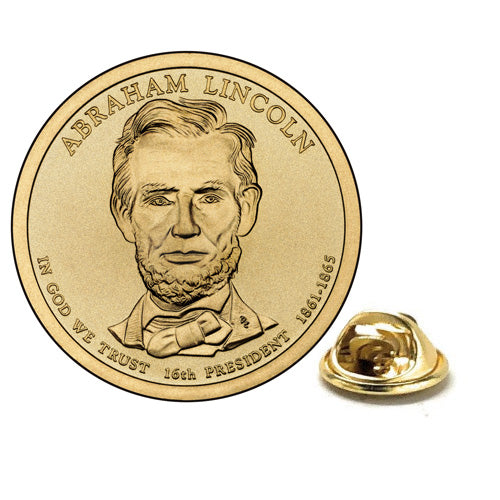Jay Pins
Abraham Lincoln Presidential Dollar Lapel Pin, Uncirculated One Gold Dollar Coin Enamel Pin
Abraham Lincoln Presidential Dollar Lapel Pin, Uncirculated One Gold Dollar Coin Enamel Pin
Couldn't load pickup availability
Celebrate the enduring legacy of America’s 16th President with this Abraham Lincoln Presidential Dollar Lapel Pin, crafted from an uncirculated U.S. Presidential $1 coin. Featuring Lincoln’s portrait in brilliant gold tone, this collectible pin is set with a durable enamel backing, making it both a historical keepsake and a wearable accessory.
Perfect for history enthusiasts, coin collectors, educators, and patriotic Americans, this Lincoln lapel pin adds a distinguished touch to jackets, hats, ties, or bags. Whether you’re honoring Lincoln’s leadership during the Civil War or searching for a meaningful gift for collectors and history lovers, this pin makes a timeless statement of patriotism and pride.
✔ Genuine uncirculated U.S. Presidential Dollar coin
✔ Enamel backing for secure and comfortable wear
✔ Collectible and wearable historical accessory
✔ Ideal gift for patriotic occasions, history buffs, or collectors
Approximately .80" in diameter
Authentic Uncirculated USA Coins
Hand Crafted by Artisan in the USA
Rhodium Plated Gold Butterfly Clasp Backing
Presidential $1 Coin Program
Presidential dollar coins began on January 1, 2007, and like the 50 State quarters program, was not scheduled to end until every eligible subject was honored. The program was to issue coins featuring each of four presidents per year on the obverse, issuing one for three months before moving on to the next president in chronological order by term in office. To be eligible, a President must have been deceased for at least two years prior to the time of minting. The United States Mint called it the Presidential $1 Coin Program.
Background
Abraham Lincoln, the 16th U.S. President, was born February 12, 1809, near Hodgenville, Ky., into a poor frontier family. A self-taught lawyer, he also served in the Illinois legislature and the U.S. House of Representatives. In 1858, while campaigning for a seat in the U.S. Senate, Lincoln engaged incumbent Stephen A. Douglas in a series of debates over slavery. Though he lost the election, Lincoln’s eloquence won him national attention, and in 1860, he received the Republican Presidential nomination. Lincoln became President of the United States in 1861 as the Nation descended into the Civil War.
While he was President, Lincoln issued the Emancipation Proclamation, which freed the slaves living in the Confederacy. Although the Confederate States ignored the proclamation, it allowed Union soldiers to free slaves they found in the South and recruit them into their army. By the time the Civil War ended, one out of eight members of the Union Army was black. On November 19, 1863, he delivered his famous Gettysburg Address. His example of assuming sole authority during a time of war was followed by later Presidents, including Woodrow Wilson in World War I and Franklin Roosevelt in World War II. While the Civil War and efforts to abolish slavery dominated his presidency, Lincoln also signed into law the Homestead Act, which made it possible for poor people to buy land provided they agreed to settle and work there for at least five years. This law began the settlement of the American West.
On April 14, 1865—only a few weeks into his second administration and just as the Civil War was ending—Lincoln was shot by Southern sympathizer John Wilkes Booth, and died the next morning in Washington, D.C.
Share









